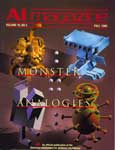Monster Analogies
DOI:
https://doi.org/10.1609/aimag.v16i3.1145Abstract
Analogy has a rich history in Western civilization. Over the centuries, it has become reified in that analogical reasoning has sometimes been regarded as a fundamental cognitive process. In addition, it has become identified with a particular expressive format. The limitations of the modern view are illustrated by monster analogies, which show that analogy need not be regarded as something having a single form, format, or semantics. Analogy clearly does depend on the human ability to create and use well-defined or analytic formats for laying out propositions that express or imply meanings and perceptions. Beyond this dependence, research in cognitive science suggests that analogy relies on a number of genuinely fundamental cognitive capabilities, including semantic flexibility, the perception of resemblances and of distinctions, imagination, and metaphor. Extant symbolic models of analogical reasoning have various sorts of limitation, yet each model presents some important insights and plausible mechanisms. I argue that future efforts could be aimed at integration. This aim would include the incorporation of contextual information, the construction of semantic bases that are dynamic and knowledge rich, and the incorporation of multiple approaches to the problems of inference constraint.Downloads
Published
1995-09-15
How to Cite
Hoffman, R. R. (1995). Monster Analogies. AI Magazine, 16(3), 11. https://doi.org/10.1609/aimag.v16i3.1145
Issue
Section
Articles
License
This is an open access article under the terms of the Creative Commons Attribution License, which permits use, distribution and reproduction in any medium, provided the original work is properly cited.
Authors who publish with this journal agree to the following terms:
- The author(s) warrants that they are the sole author and owner of the copyright in the above article/paper, except for those portions shown to be in quotations; that the article/paper is original throughout; and that the undersigned right to make the grants set forth above is complete and unencumbered.
- The author(s) agree that if anyone brings any claim or action alleging facts that, if true, constitute a breach of any of the foregoing warranties, the author(s) will hold harmless and indemnify AAAI, their grantees, their licensees, and their distributors against any liability, whether under judgment, decree, or compromise, and any legal fees and expenses arising out of that claim or actions, and the undersigned will cooperate fully in any defense AAAI may make to such claim or action. Moreover, the undersigned agrees to cooperate in any claim or other action seeking to protect or enforce any right the undersigned has granted to AAAI in the article/paper. If any such claim or action fails because of facts that constitute a breach of any of the foregoing warranties, the undersigned agrees to reimburse whomever brings such claim or action for expenses and attorneys’ fees incurred therein.
- Author(s) retain all proprietary rights other than copyright (such as patent rights).
- Author(s) may make personal reuse of all or portions of the above article/paper in other works of their own authorship.
- Author(s) may reproduce, or have reproduced, their article/paper for the author’s personal use, or for company use provided that original work is property cited, and that the copies are not used in a way that implies AAAI endorsement of a product or service of an employer, and that the copies per se are not offered for sale. The foregoing right shall not permit the posting of the article/paper in electronic or digital form on any computer network, except by the author or the author’s employer, and then only on the author’s or the employer’s own web page or ftp site. Such web page or ftp site, in addition to the aforementioned requirements of this Paragraph, must provide an electronic reference or link back to the AAAI electronic server, and shall not post other AAAI copyrighted materials not of the author’s or the employer’s creation (including tables of contents with links to other papers) without AAAI’s written permission.
- Author(s) may make limited distribution of all or portions of their article/paper prior to publication.
- In the case of work performed under U.S. Government contract, AAAI grants the U.S. Government royalty-free permission to reproduce all or portions of the above article/paper, and to authorize others to do so, for U.S. Government purposes.
- In the event the above article/paper is not accepted and published by AAAI, or is withdrawn by the author(s) before acceptance by AAAI, this agreement becomes null and void.

